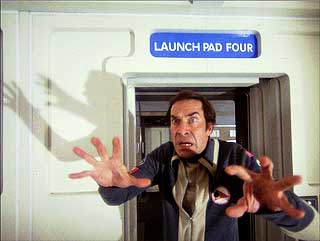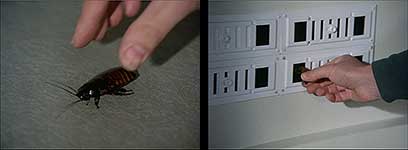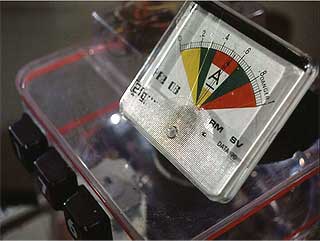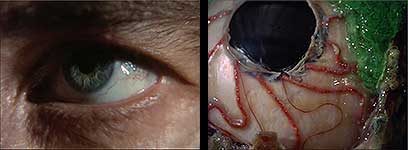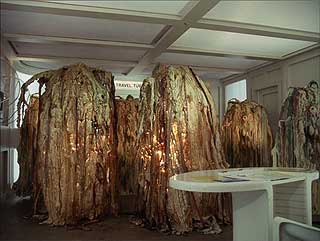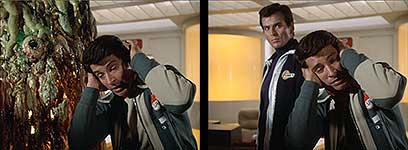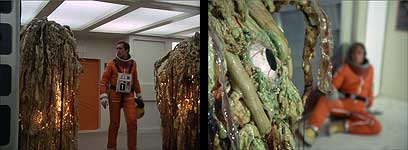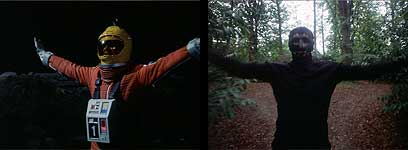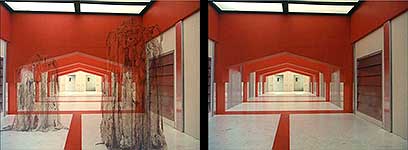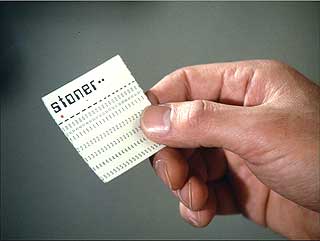The Bringers of Wonder
Thursday, October 26th, 2006 • Horrorthon Posts / Horrorthon Reviews
Okay, here we go with another HORRORTHON entry: “The Bringers of Wonder”, a two part episode of Space: 1999. Not suitable for Horrothon, you say? Nonsense! This is two hours of pure fear! Take it from me. (If it were merely an ordinary single episode of Space: 1999, of course, I wouldn’t dream of besmirching Horrorthon with such feeble, sub-par material. It’s the story’s deserved expansion to a full two hours of syndicated British television that makes all the difference, “doubling” the fear if you will).
By the way I am going to LOSE Horrorthon; let there be no doubt about that. If the four of you are The Partridge Family, I’m Reuben. We all knew this already; no need dwelling on my “irrelevant court jester” status. I accept my lot in life.
On Moonbase Alpha, two unrelated events herald the TWO HOURS OF PURE FEAR I mentioned above. The first is that Commander John Koenig goes nuts and crashes his Eagle spacecraft near the nuclear waste dumps. If the preceding sentence doesn’t make any sense to you, suffice it to say that “The Bringers of Wonder” is a story set within the fictional context of “Space: 1999,” or rather, within the single most absurd set of premises ever foisted upon the television viewing public in the history of the medium, and that includes My Favorite Martian, CopRock and The West Wing. All you need to know is that it’s essentially Lost in Space except instead of a spacecraft they’re using the entire mass of the Earth’s moon to travel around, and instead of loveable kids there’s an angry Australian and an angry Italian and a woman who can turn into a dizzying array of stunt men in rubber monster suits (more on this below). Koenig’s daylight madness causes him to barely miss the domes of the nuclear waste dump (where, two harrowing hours later, the story will end) and crash into the unforgiving lunar terrain, whereupon the spacecraft erupts into flames. (I just realized that the beginning of “The Bringers of Wonder” must have been the source for a plot point that I stole much later on, for a story of my own.) Koenig’s mysterious “crazy flying” behavior in the opening is never explained (which, somehow, succeeds in making the entire story that much more eerie; at least, that’s my opinion).
Putting Maya into the wall
(note 220-volt “European” electrical outlets, requiring extra adapters for electric shavers, etc.)
The episode (*cough* *cough* sorry, “horror movie” *cough*) now abruptly slackens into an extremely slow-moving pace that will be maintained with almost 100% consistency throughout the story. First, Koenig is rescued, hospitalized, diagnosed, and treated, over the course of several days, during which he remains comatose. All of this occurs under the aegis of Moonbase Alpha’s Chief Medical Officer, Dr. Helena Russell, M.D., Ph.D, a character portrayed by the most dreadful actress ever to step before the cameras or audience in any medium ever including industrial training films and voice-overs for technical school television ads. That’s right, Koenig has been moved to a couch to be ministered over by the one and only Barbara Bain, with her hair bleached nearly white (while Catherine Schell’s naturally blond hair is dyed a nauseating red, which, along with Schell’s Cruella deVille makeup, serves to appease the unfire-able Ms. Bain, then-husband to actual actor Martin Landau). I think I’d chose the monsters over that. (Later in the story, Koenig is actually bound into his medical couch with straps, while Dr. Russell continues to hover over him, serenely holding out medical apparatus in front of herself or vaguely peering at the intruments on the wall. Did I mention two hours of pure fear?)
Koening has too much “A”
Koenig’s medical dillemae keep him out of action for thirty-five minutes of screen time—which is all it takes for Moonbase Alpha to plunge into the most dangerous impending catastophe they’ll ever face, in all forty-eight episodes (or, forty-seven, if you take into account that “The Bringers of Wonder” is really just a two-part story and not two separate episodes). When Koening regains consciousness, he awakens to a nightmare so severe that it has him very upset indeed; not to mention the added problem of being the only person on Moonbase Alpha who has the slightest idea that anything’s wrong.
But what’s the problem, exactly, you ask? In a word:
MONSTERS.
“And if you gaze for long into an abyss, the abyss gazes also into you”
Friedrich Wilhelm Nietzsche (1844-1900)
That’s right. Never mind obscure waste products of nuclear fusion (see: difficulties involved in storing such safely); aliens who quickly misunderstand the humans’ intentions for demonstrable reasons; delicate translation problems with life forms too strange in their essential nature for us to communicate with them; beings or entities interested in seducing the Alphans to their own way of life, which would be limiting in some way; mutinous Alphans selling out the moonbase’s precious resources for their own enrichment; dangerous astronomical phenomenae; erosion of the moonbase infrastructure; social or technical problems within the base itself. In fact, never mind any of the countless interesting and/or dangerous things that could happen to a 20th century human moonbase propelled through the distant reaches of our galaxy.
The monsters have a meeting
No, this is just monsters, straight up. They’re…well…monsters. They sort of stand there. Then they shuffle around. They never make any noise or move quickly or change the direction in which they’re facing, and they don’t really have any limbs with which to menace a potential victim. What makes them so dangerous? MIND CONTROL.
A monster influences Tony’s mind so that he sees and hears Frankie Valli
These monsters possess the amazing ability to cut the actual film of the episode itself, so that the story’s action keeps moving over to an altogether different sequence with the same actors miming the same actions. In other words, the Alphans think they’re doing something else, and we get to see that, as well as what they’re actually doing (or, being fooled into doing), intercut together with devilish irony. The whole thing, as I keep saying, is really very unsettling; I mentioned something about TWO HOURS OF PURE FEAR above, and the aliens’ disquieting power to subject their victims to frantic cross-cutting is certainly the driving force behind that fear.
The monsters’ plan is to make the Alphans blow up the nuclear waste dump on the far side of the moon, to feed off its energy. (There are a great many things wrong with this plan, starting from the concept that the explosion would tend to vaporize the monsters themselves, and ending with the minor matter of the nuclear waste dumps already having been blown up in the Series Premiere; this inconsistency is not addressed.)
Koenig is powerless to stop the monsters from shuffling towards him
The monsters shamble around and, physically, are in no way threatening. The cast works very hard to convince the viewer that they are somehow repulsive, terrifying, etc. but I actually think they’re kind of cute. (“Elmo” cute, not “Cameron Diaz” cute, obviously.) As has been pointed out by many, these are sort of like “Sid and Marty Kroft” monsters. I could do without the fluids pumping through all those plastic tubes, but I imagine that one gets used to that. I also can’t imagine how the monsters sleep since they can’t close their eye and can’t really lie down. No, it’s the monsters’ terrifying mind power that puts the tension across; I suppose the contrasts have a certain Ambrose Bierce irony to them, if you will; that is, Koenig himself appears as the monster in Alan Carter’s perfervid, alien-planted fantasy of driving around—they can’t see who he really is, but they’re as repulsed by Koenig as Koenig himself, earlier, was repulsed by the actual monsters.
Koenig tries to warn Alan Carter, but Carter erroneously “sees” him as a character from one of Octopunk’s movies
Is it good sci-fi? I don’t actually know the answer to that question. I am too blinded by my own ridiculous childhood memories of how this thing was, somehow, like 2001: A Space Odyssey, Dracula and The Wizard of Oz combined. Such is the mind of a nine-year-old with a black-and-white TV.
In Kubrickville, the monsters are reduced to the fabric of dreams themselves
Is it horror? Gentlemen, I submit to you that it is, in fact, nothing less than the ultimate horror. The absolute nihilism of the slimy monsters chills me to the very bone; as I think Hannah Arendt remarked in her treatise The Banality of Evil, “to expect recognizable purpose from evil is to misundertand its nature” or some such. (Actually, okay: I made that quote up, you caught me. But I didn’t make up the title! That’s real Arendt, damn it!) Staggering towards Kubrickville, those walking intestines with sawed-apart whiffle-ball eyes are relentless even when their power is gone—the base simplicity of their dark crusade has one reeling at the cold, inhuman disregard of all other life in the face of such unslakable thirst for “power.” Such uncaring, murderous brutality from those whose abilities are so wondrous! They have the sophistication to synthesize convincing total illusions of unyielding persuaive power; of creating and flying vast starships across vast interstellar distances; all to stagger around amid their lemming-like prey; the sustenance of the nuclear explosions cannot silence the voices of the damned (in this case, the victims, as the Alphans came perilously close to becoming themselves!) Gentlemen, I give you “The Bringers of Wonder (Parts 1 & 2)”—A nuclear nightmare indeed. Can we really know where we’re going as we harness the power of the atom—with no regard for the dire consequences that await? What about OUR “illusions?”
